

Structure and agency. Structure, socialization and autonomy[edit]
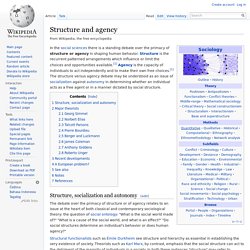
U-procedure and Theory U. U-procedure and Theory U is a change management method to change unproductive patterns of behavior.
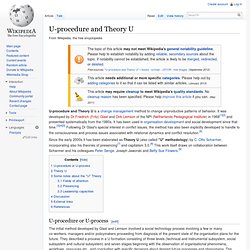
It was developed by Dr Friedrich (Fritz) Glasl and Dirk Lemson of the NPI (Netherlands Pedagogical Institute) in 1968[1][2] and presented systematically from the 1980s. It has been used in organisation development and social development since that time.[3][4][5] Following Dr Glasl's special interest in conflict issues, the method has also been explicitly developed to handle to the consciousness and process issues associated with relational dynamics and conflict resolution.[6] Since the early 2000s it has been elaborated as Theory U (also called "U" methodology) by C.
Positive Deviance. Positive Deviance is an approach to behavioral and social change based on the observation that in any community, there are people whose uncommon but successful behaviors or strategies enable them to find better solutions to a problem than their peers, despite facing similar challenges and having no extra resources or knowledge than their peers. These individuals are referred to as positive deviants.[1][2][3] The concept first appeared in nutrition research in the 1970s.
Researchers observed that despite the poverty in a community, some poor families had well nourished children. Some suggested using information gathered from these outliers to plan nutrition programs.[4][5] Principles of the PD approach[edit] The Positive Deviance approach is a strength-based approach which is applied to problems requiring behavior and social change. Communities already have the solutions.
Action theory (sociology) In sociology, action theory refers to the theory of social action presented by the American theorist Talcott Parsons.
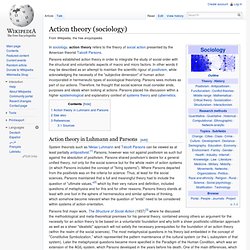
Action theory (philosophy) What is left over if I subtract the fact that my arm goes up from the fact that I raise my arm?
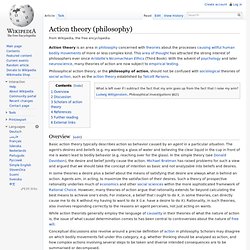
In some theories a desire plus a belief about the means of satisfying that desire are always what is behind an action. Agents aim, in acting, to maximize the satisfaction of their desires. Such a theory of prospective rationality underlies much of economics and other social sciences within the more sophisticated framework of Rational Choice. However, many theories of action argue that rationality extends far beyond calculating the best means to achieve one's ends. For instance, a belief that I ought to do X, in some theories, can directly cause me to do X without my having to want to do X (i.e. have a desire to do X).
Agency (philosophy) Agency may either be classified as unconscious, involuntary behavior, or purposeful, goal directed activity (intentional action).
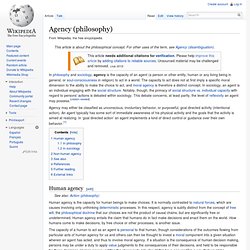
An agent typically has some sort of immediate awareness of his physical activity and the goals that the activity is aimed at realizing. In ‘goal directed action’ an agent implements a kind of direct control or guidance over their own behavior.[1] Human agency is the capacity for human beings to make choices. It is normally contrasted to natural forces, which are causes involving only unthinking deterministic processes. In this respect, agency is subtly distinct from the concept of free will, the philosophical doctrine that our choices are not the product of causal chains, but are significantly free or undetermined.
In certain philosophical traditions (particularly those established by Hegel and Marx), human agency is a collective, historical dynamic, rather than a function arising out of individual behavior. Bandura, A. (2001). Intentionality. Intentionality is a philosophical concept defined by the Stanford Encyclopedia of Philosophy as "the power of minds to be about, to represent, or to stand for, things, properties and states of affairs".[1] The term refers to the ability of the mind to form representations and has nothing to do with intention.
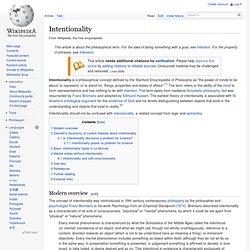
The term dates from medieval Scholastic philosophy, but was resurrected by Franz Brentano and adopted by Edmund Husserl. Moral responsibility. People who have moral responsibility for an action are called moral agents. Agents are capable of reflecting on their situation, forming intentions about how they will act, and then carrying out that action. The notion of free will is an important issue in the debate on whether individuals are ever morally responsible for their actions and, if so, in what sense. Incompatibilists think that determinism is at odds with free will, whereas compatibilists think the two can coexist.
Moral responsibility is not necessarily the same as legal responsibility. Learning organization. A learning organization is the term given to a company that facilitates the learning of its members and continuously transforms itself.[1] Learning organizations develop as a result of the pressures facing modern organizations and enables them to remain competitive in the business environment.[2] A learning organization has five main features; systems thinking, personal mastery, mental models, shared vision and team learning.[3] The Learning organization concept was coined through the work and research of Peter Senge and his colleagues [4] .
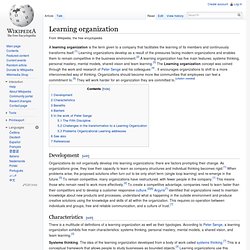
It encourages organizations to shift to a more interconnected way of thinking. Organizations should become more like communities that employees can feel a commitment to.[5] They will work harder for an organization they are committed to. [citation needed] Development[edit] Organizations do not organically develop into learning organizations; there are factors prompting their change. Characteristics[edit] Systems thinking. Personal mastery. Mindfulness. Mindfulness (Pali: sati,[1] Sanskrit: smṛti; also translated as awareness) is a spiritual or psychological faculty (indriya) that, according to the teaching of the Buddha, is of great importance in the path of enlightenment.
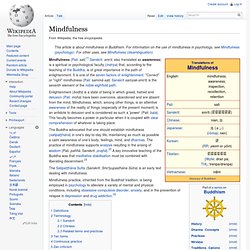
It is one of the seven factors of enlightenment. "Correct" or "right" mindfulness (Pali: sammā-sati, Sanskrit samyak-smṛti) is the seventh element of the noble eightfold path. The Buddha advocated that one should establish mindfulness (satipaṭṭhāna) in one's day-to-day life, maintaining as much as possible a calm awareness of one's body, feelings, mind, and dharmas. Evolutionary biology. Evolutionary biology is a sub-field of biology concerned with the study of the evolutionary processes that produced the diversity of life on Earth.
Someone who studies evolutionary biology is known as an evolutionary biologist. Evolutionary biologists study the descent of species, and the origin of new species. Subfields[edit] The study of evolution is the unifying concept in evolutionary biology. Evolutionary biology is a conceptual subfield of biology that intersects with other subfields that are delimited by organizational level (e.g., cell biology, population biology), taxonomic level (e.g., zoology, ornithology, herpetology) or angle of approach (e.g., field biology, theoretical biology, experimental evolution, paleontology).